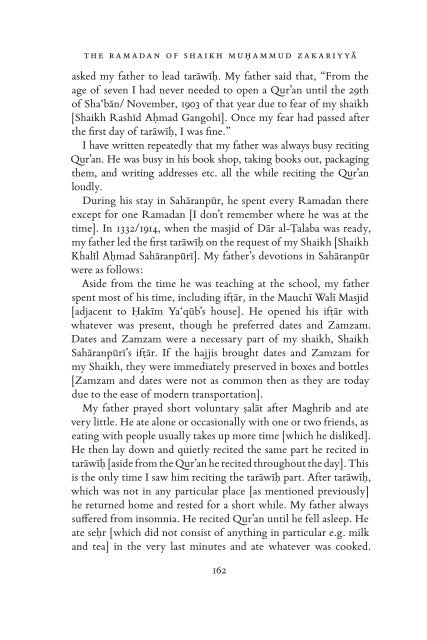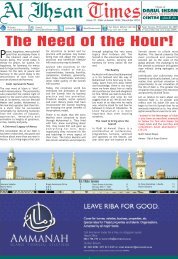TheRamadan of Shaykh Al-Hadith Ml ZakariyyaKandelwi by Dr Muhammad Ismail Memon Madani
TheRamadan of Shaykh Al-Hadith Ml ZakariyyaKandelwi by Dr Muhammad Ismail Memon Madani
TheRamadan of Shaykh Al-Hadith Ml ZakariyyaKandelwi by Dr Muhammad Ismail Memon Madani
Create successful ePaper yourself
Turn your PDF publications into a flip-book with our unique Google optimized e-Paper software.
the ramadan <strong>of</strong> shaikh muĤ ammud zakariyyĀ<br />
asked my father to lead tarāwīĥ. My father said that, “From the<br />
age <strong>of</strong> seven I had never needed to open a Qur’an until the 29th<br />
<strong>of</strong> Sha‘bān/ November, 1903 <strong>of</strong> that year due to fear <strong>of</strong> my shaikh<br />
[Shaikh Rashīd Aĥmad Gangohī]. Once my fear had passed after<br />
the first day <strong>of</strong> tarāwīĥ, I was fine.”<br />
I have written repeatedly that my father was always busy reciting<br />
Qur’an. He was busy in his book shop, taking books out, packaging<br />
them, and writing addresses etc. all the while reciting the Qur’an<br />
loudly.<br />
During his stay in Sahāranpūr, he spent every Ramadan there<br />
except for one Ramadan [I don’t remember where he was at the<br />
time]. In 1332/1914, when the masjid <strong>of</strong> Dār al-Ţalaba was ready,<br />
my father led the first tarāwīĥ on the request <strong>of</strong> my Shaikh [Shaikh<br />
Khalīl Aĥmad Sahāranpūrī]. My father’s devotions in Sahāranpūr<br />
were as follows:<br />
Aside from the time he was teaching at the school, my father<br />
spent most <strong>of</strong> his time, including ifţār, in the Mauchī Walī Masjid<br />
[adjacent to Ĥakīm Ya‘qūb’s house]. He opened his ifţār with<br />
whatever was present, though he preferred dates and Zamzam.<br />
Dates and Zamzam were a necessary part <strong>of</strong> my shaikh, Shaikh<br />
Sahāranpūrī’s ifţār. If the hajjis brought dates and Zamzam for<br />
my Shaikh, they were immediately preserved in boxes and bottles<br />
[Zamzam and dates were not as common then as they are today<br />
due to the ease <strong>of</strong> modern transportation].<br />
My father prayed short voluntary śalāt after Maghrib and ate<br />
very little. He ate alone or occasionally with one or two friends, as<br />
eating with people usually takes up more time [which he disliked].<br />
He then lay down and quietly recited the same part he recited in<br />
tarāwīĥ [aside from the Qur’an he recited throughout the day]. This<br />
is the only time I saw him reciting the tarāwīĥ part. After tarāwīĥ,<br />
which was not in any particular place [as mentioned previously]<br />
he returned home and rested for a short while. My father always<br />
suffered from insomnia. He recited Qur’an until he fell asleep. He<br />
ate seĥr [which did not consist <strong>of</strong> anything in particular e.g. milk<br />
and tea] in the very last minutes and ate whatever was cooked.<br />
162



